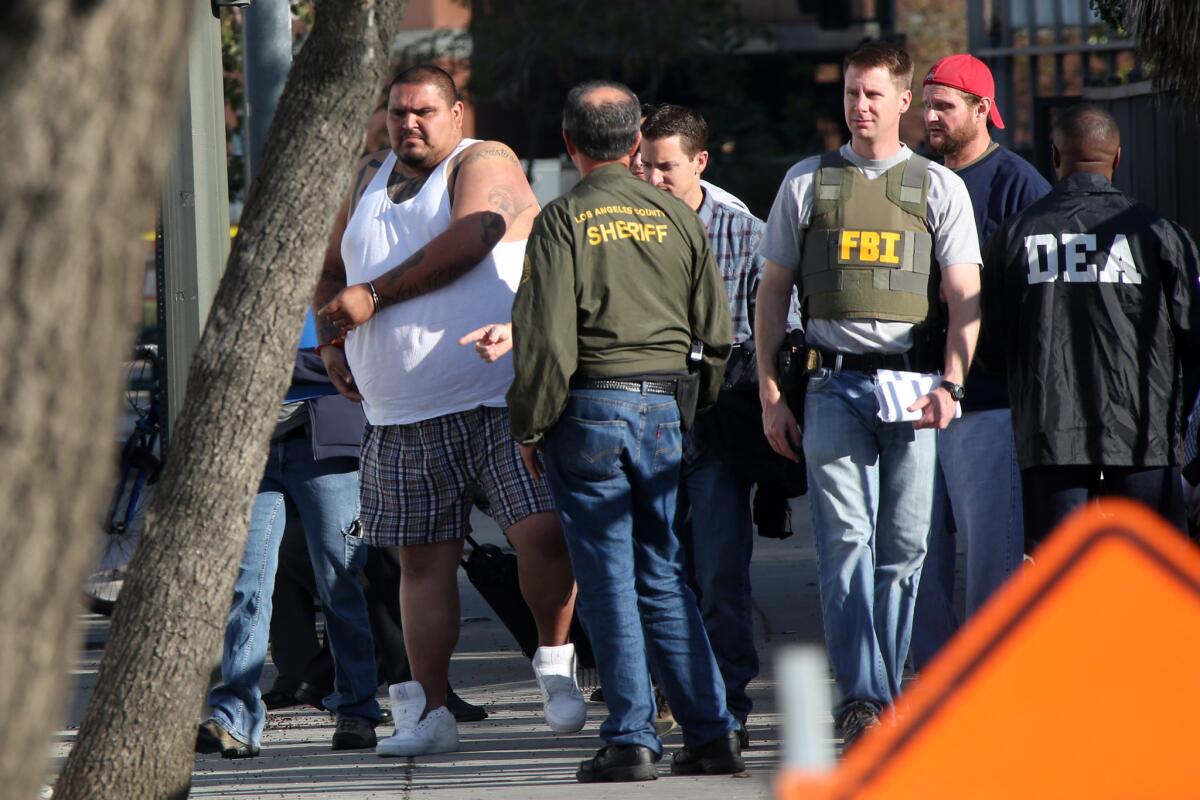California gang database plagued with errors, unsubstantiated entries, state auditor finds

- Share via
A California gang database maintained by law enforcement agencies is rife with unsubstantiated entries, names that should have been purged long ago and glaring errors, a state audit released Thursday found.
As a result of poor oversight, the CalGang database, which includes the names of more than 150,000 suspected gang members and affiliates, contains questionable information that may violate the privacy rights of many individuals, according to the audit.
In one of the most telling examples, auditors found the names of 42 people whose birth dates indicated they were one year of age or younger at the time they were entered into the database. Of those, 28 were entered for “admitting to being gang members,” according to State Auditor Elaine M. Howle.
Although state-funded, the CalGang database is overseen by an executive board and advisory committee made up of local law enforcement officials with no statutory authority. Howle noted that model means there is almost no public transparency or scrutiny of its work.
“Our review uncovered numerous examples demonstrating weaknesses in the user agencies’ approaches for entering information into CalGang,” auditors wrote
For decades the database has been a way for police officers to check on suspected gang ties and affiliations.
A sample of data from four user agencies — Los Angeles and Santa Ana police and Santa Clara County and Sonoma County sheriffs — found they “could not substantiate numerous CalGang entries they had made, demonstrating weaknesses in the processes for entering, evaluating and auditing the data in CalGang,” the audit said.
A review of 100 individuals placed in the database by the four agencies found 13 were “inappropriately included.”
Auditors found more than 600 individuals who were still listed even though their files should have been purged because they hadn’t been updated within five years. Many of those records were not scheduled to be purged for more than 100 years.
In 2015, nearly 15,000 gang members or affiliates were added to the system while a little over 33,000 were removed. The database is overwhelmingly male — some 93.1% — and disproportionately minority — 64.9% Latino and 20.5% black.
Los Angeles and Santa Ana, the auditors noted, failed to fully implement a 2014 state law that requires juveniles and their parents to be notified before their names are added to the gang database so they could contest the decision. Of 129 juvenile records examined from the two agencies, 70% had been added without proper notification.
The LAPD did not explain the reasons why some minors were being added to the database and in some cases did not notify the juveniles at all or only after they were added.
Howle recommended that CalGang be overhauled with a new oversight structure, administered by the state Department of Justice.
Other recommendations include conducting public hearings and adopting new entry, review and information-sharing requirements. The audit called for police agencies across the state to do a comprehensive review of their entries.
Representatives of civil rights organizations said the audit confirmed what many have long suspected.
”CalGang is an ineffective tool full of inaccuracies that result in violations of people’s rights,” said Peter Bibring, director of police practices at the ACLU of California.
Many of the police agencies cited in the audit agreed with its recommendations.
In a response to the draft report, LAPD Deputy Chief Matt Blake said the department is revising its standards and expects to complete reviews in the next couple of years of all its 40,000 entries.
Blake, however, questioned the report’s suggestion that the database entries had violated privacy rights, saying the accusation might harm public trust in law enforcement. He also praised his gang detail officers for their ability to identify gang members.
Similarly, Santa Ana Police Chief Carlos Rojas in a letter questioned how the report could praise his department’s work in notifying juvenile’s families but still be dinged for its overall performance on that issue.
The Sonoma County Sheriff’s Department disputed the audit findings, saying the department met state guidelines for entries.
Follow @lacrimes on Twitter
ALSO
Courts overturn sentences for two California death row inmates and uphold another
Four injured when truck drives through MacArthur Park; the driver is released by police
Demonstrators call on D.A. to decide whether to prosecute LAPD officers who shot Ezell Ford
More to Read
Sign up for Essential California
The most important California stories and recommendations in your inbox every morning.
You may occasionally receive promotional content from the Los Angeles Times.










